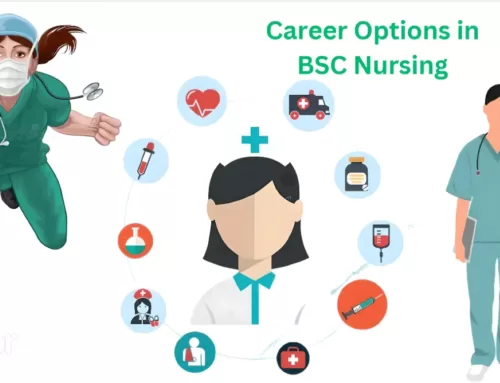If you’re passionate about heart health and helping others, becoming a cardiologist may be the perfect career choice for you.
Cardiologists are medical professionals who specialize in diagnosing and treating heart-related conditions, playing a critical role in helping patients manage heart disease from prevention to treatment.
In this comprehensive guide, we will explore the steps you need to take to become a cardiologist, including the education and qualifications required, duration of courses, top medical schools for cardiologists, necessary skills, salary of a cardiologist in India and abroad, and more.
If you’re interested in embarking on a fulfilling career as a heart specialist doctor, join us as we discover everything you need to know about how to become a cardiologist.
Who is a Cardiologist?
Cardiologists are medical professionals who specialize in diagnosing and treating conditions related to the heart and blood vessels. They are experts in the cardiovascular system and have deep knowledge of heart functions, diseases, and treatments. Here are some essential details about cardiologists:
Heart Specialist Doctors use a variety of diagnostic tools and procedures to identify and treat heart conditions, such as electrocardiograms, stress tests, echocardiograms, angioplasty, and stenting.
They work in hospitals, clinics, private practices, and universities, conducting research and teaching.
What does a Cardiologist do – Roles and Responsibilities
Cardiologists play an important role in helping patients manage heart disease and maintain good heart health. such as Diagnosing and treating heart and blood vessels diseases, such as coronary artery disease, heart failure, and arrhythmias.
- Creating heart disease treatment plans that include medication, lifestyle changes, and angioplasty or stenting.
- Testing heart function and diagnosing conditions with electrocardiograms, echocardiograms, stress tests, and angiograms.
- Monitoring heart surgery patients to prevent complications and ensure recovery.
- Preventing heart disease in high blood pressure and cholesterol patients.
- Coordinating patient care with primary care physicians, nurses, and cardiac surgeons.
- Researching and testing heart disease treatments.
Types of Cardiologist
Cardiology is a broad discipline with various sub – specialties. Some of the most common types of cardiologists are as follows:
- Non-Invasive Cardiologist: These medical professionals use non-invasive procedures and tests to diagnose and treat heart conditions.
- Interventional Cardiologist: These heart specialists use invasive procedures, such as angioplasty and stenting, to diagnose and treat heart conditions.
- Invasive Cardiologist: These cardiologists specialize in performing invasive procedures, such as cardiac catheterization and angiography, to diagnose and treat heart conditions.
- Cardiac Surgeons: These medical professionals perform surgical procedures to treat heart conditions, such as coronary artery bypass surgery or valve replacement surgery.
- Cardiothoracic Surgeon: These specialists perform surgical procedures on the heart, lungs, and other thoracic organs.
- Electrophysiologist Cardiologist: These specialists diagnose and treat heart rhythm disorders, such as arrhythmias.
- Pediatric Cardiologist: These medical professionals specialize in diagnosing and treating heart conditions in children and adolescents.
Skills Required to Become a Cardiologist or Heart Specialist Doctor
Becoming a cardiologist or heart specialist doctor requires a unique combination of medical knowledge, technical skills, and personal attributes. Here are some of the key skills needed to succeed in this field:
Analytical and problem-solving skills:
Cardiologists must be able to analyze complex medical data, analyze diagnostic tests, and develop effective treatment plans for patients with heart conditions.
Attention to detail:
In cardiology, even small details can have significant implications for patient health. Cardiologists must be extremely careful in their work to ensure accuracy and precision.
Communication and interpersonal skills:
Cardiologists must be able to communicate effectively with patients, families, and other healthcare professionals. They must be able to explain complex medical concepts in a clear and understandable way and build strong relationships with patients.
Compassion and empathy:
Cardiologists work with patients who are often facing serious health challenges. They must be able to demonstrate compassion and empathy while providing medical care and emotional support.
Physical agility:
Some cardiology procedures, such as angiography and cardiac catheterization, require manual Skills and hand-eye coordination.
Stamina and resilience:
Cardiology can be a demanding field, and cardiologists must be able to work long hours and handle the emotional stress that can come with treating seriously ill patients.
Commitment to ongoing learning:
Cardiology is a constantly evolving field, and cardiologists must be committed to staying up-to-date with the latest research, techniques, and technology in order to provide the best possible care to their patients.
These abilities, when combined with extensive clinical training and education, can help aspiring cardiologists in becoming successful heart specialists.
Eligibility
To become a cardiologist in India, candidates must have completed their 10+2 level education in the science stream with Physics, Chemistry, and Biology as core subjects. They must clear the National Eligibility cum Entrance Test (NEET) and complete an MBBS degree from a recognized government or private medical college. After that, they must complete a three-year postgraduate degree in cardiology and a one-year internship. Aspiring cardiologists must also complete a six-year residency program in internal medicine and cardiology.
How to Become a Cardiologist in India? A Step-by-Step Guide
Becoming a cardiologist in India requires a rigorous and challenging process. Here’s a step-by-step guide on how to become a cardiologist:
Step 1: Complete the 10+2 level education:
Students must complete the 10+2 level education in the science stream with Physics, Chemistry, and Biology as core subjects.
Step 2: Appear for the NEET exam
Students must appear and clear the National Eligibility cum Entrance Test (NEET) conducted by the National Testing Agency (NTA) to be eligible for admission to medical colleges.
Step 3: Enroll in a medical college:
After clearing the NEET exam, students can enroll in a medical college to pursue the MBBS program, which is a five-and-a-half-year course, including a one-year internship.
Step 4: Complete a postgraduate degree:
After completing the MBBS program, students can enroll in a postgraduate degree program in cardiology, such as Doctor of Medicine (MD) or Master of Surgery (MS). This is a three-year program that provides advanced training in cardiology.
Step 5: Complete a residency program:
After completing the postgraduate degree, students must complete a three-year residency program in internal medicine, followed by a three-year residency program in cardiology.
Step 6: Obtain a medical license:
After completing the residency program, students must obtain a medical license from the Medical Council of India (MCI) to practice as a cardiologist.
By following these steps, students can pursue a successful career as a cardiologist in India.
Entrance Exams to Become a Heart Specialist Doctor
To become a cardiologist in India, it is essential to clear the required entrance exams. These exams serve as the first step towards achieving the goal of becoming a heart specialist doctor.
Here are the top medical entrance exams in India:
- National Eligibility cum Entrance Test (NEET)
- AIIMS-PG
- JIPMER
- NEET-SS
Best Colleges For Cardiology In India
Here are some of the best colleges for aspiring cardiologists in India:
- All India Institute of Medical Sciences (AIIMS), New Delhi
- Post Graduate Institute of Medical Education and Research (PGIMER), Chandigarh
- Christian Medical College (CMC), Vellore
- Sanjay Gandhi Postgraduate Institute of Medical Sciences (SGPGIMS), Lucknow
- Jawaharlal Institute of Postgraduate Medical Education and Research (JIPMER), Puducherry
- Kasturba Medical College (KMC), Manipal
- Armed Forces Medical College (AFMC), Pune
- Sri Ramachandra Institute of Higher Education and Research, Chennai
- Government Medical College, Thiruvananthapuram
- Institute of Medical Sciences Banaras Hindu University (IMS BHU), Varanasi
- Parul University, Vadodara
Cardiologist Salary in India & Abroad
Check out the Cardiologist Salary in India and Abroad based on experience:
Private Hospital Cardiologist Salary Table:
| Experience | Salary Range (per year) |
| 0-2 years | ₹3,00,000 – ₹5,00,000 |
| 2-5 years | ₹5,00,000 – ₹10,00,000 |
| 5-10 years | ₹10,00,000 – ₹20,00,000 |
| 10+ years | ₹20,00,000 and above |
Source: Glassdoor
Government Hospital Cardiologist Salary Table:
| Experience | Salary Range (per year) |
| 0-2 years | ₹6,00,000 – ₹8,00,000 |
| 2-5 years | ₹8,00,000 – ₹15,00,000 |
| 5-10 years | ₹15,00,000 – ₹25,00,000 |
| 10+ years | ₹25,00,000 and above |
Cardiologist Salary in Abroad
United States: $200,000 – $400,000 per year
United Kingdom: £100,000 – £150,000 per year
Australia: AU$200,000 – AU$400,000 per year
Canada: CAD$200,000 – CAD$400,000 per year
Note: These salaries are approximate and may vary depending on various factors such as location, type of hospital/clinic, and years of experience.
Pros and Cons
Here are some potential pros and cons of becoming a cardiologist:
Pros:
- Opportunity to help people manage and treat heart disease, improving their quality of life
- Constantly evolving field with new advancements in technology and treatments
- High earning potential and job stability
- Ability to work in a variety of settings, including hospitals, clinics, private practice, and research
- Collaboration with other medical professionals to provide comprehensive care for patients
Cons:
- High levels of stress and responsibility, as cardiologists often deal with life-threatening conditions
- Long and rigorous education and training process
- Demanding work hours, including nights, weekends, and on-call shifts
- Significant student loan debt may be incurred during the education and training process
- Potential for burnout due to the high demands of the profession
Note** It’s important to keep in mind that these pros and cons can vary based on individual experiences and circumstances.
Summary
Becoming a cardiologist or heart specialist doctor requires dedication, hard work, and a passion for helping others. The journey to becoming a cardiologist can be challenging but fulfilling, offering numerous opportunities for personal and professional growth.
From educational qualifications and entrance exams to salary and career opportunities, we have covered all aspects of how to become a cardiologist in India.
We hope this guide has provided valuable insights into pursuing a career as a heart specialist doctor, and we invite you to share your thoughts and experiences in the comments below.
FAQs
How Many Years To Become A Cardiologist In India?
To become a cardiologist in India, you need to complete a +2 science in PCB then Bachelor of Medicine and Bachelor of Surgery (MBBS) degree from a recognized medical college, followed by a three-year postgraduate degree in cardiology. The duration to become a cardiologist can vary from 9-11 years.
Is Cardiology A Good Career?
Yes, cardiology is a good career option for those who have a passion for heart health and helping others. It is a growing field with opportunities for specialization and growth.
Is Neet Required For Cardiology?
Yes, NEET is required to pursue a career in cardiology in India. Aspirants must clear the National Eligibility cum Entrance Test (NEET) for admission to medical courses in government and private medical colleges across the country.
How Many Hours Do Cardiologists Work?
Cardiologists typically work long and irregular hours, including nights, weekends, and holidays. The working hours can range from 50-60 hours a week.
Which Subjects Are Required For A Cardiologist?
To become a cardiologist, you need to have a strong foundation in science subjects such as physics, chemistry, and biology. Additionally, mathematics, English, and computer science are also essential.
Is Cardiology Stressful?
Like any medical profession, cardiology can be stressful due to the nature of the work and the responsibility involved in caring for patients with heart disease.
Can A Woman Become A Cardiologist?
Yes, women can become cardiologists. There is no gender restriction in pursuing a career in cardiology.
Do Cardiologists Get Weekends Off?
Cardiologists typically work long and irregular hours, including weekends and holidays. However, some may have the option of taking weekends off, depending on their work setting and schedule.
Can Doctors Have A Social Life?
Although the work of a cardiologist can be demanding, it is possible to have a social life outside of work with proper time management and prioritization.
How To Become A Cardiologist After 12th?
To become a cardiologist after 12th, you need to complete a +2 science in PCB then Bachelor of Medicine and Bachelor of Surgery (MBBS) degree from a recognized medical college, followed by a three-year postgraduate degree in cardiology.
How Much Does A Cardiologist Earn In India?
The salary of a cardiologist in India varies depending on the work setting, experience, and qualifications. Generally, a cardiologist with 0-5 years of experience can earn an average salary of INR 5-10 lakh per month.
Does A Cardiologist Do Surgery?
Cardiologists typically specialize in non-surgical treatment of heart-related conditions. However, some may also perform procedures such as angioplasty, stent placement, and pacemaker implantation.




